5 Tech Innovations Shaping the Future of Recruitment Processes

With the fast-paced technological progress of our age, the arena for employment recruitment has been reshaped to a very great extent. The traditional approach is being phased out to make place for modern technologies that claim to speed up and perfect all the tasks in talent recruitment. Due to the tough competition in the business world, enterprises are considering high-tech novelties for the recruitment, assessment, and retention of the best talents in an effective manner. Below we will explore a technology breakthrough that takes recruitment and enterprise resource planning HR-practices into a new dimension.
AI-Powered Candidate Screening and Matching:
Artificial Intelligence (AI) settles the pace, as it transforms the way organizations select and appraise possible candidates. One of the major advantages of AI in screening for automation jobs is the use of advanced algorithms and machine learning capabilities. The integration of an online recruitment management system represents a pivotal advancement. The recruitment process becomes more streamlined and efficient by harnessing the capabilities of artificial intelligence. Moreover, AI-powered screening tools analyze candidates’ resumes, social profiles, and online assessments to identify the best matches based on their skills and experience. The main advantage of these systems is not only that they save time and resources but also the fact that they exclude any unconscious bias in recruitment through examining solely the prospects’ qualification and skills.
Virtual Reality (VR) Job Previews and Assessments:
VR, which is amazing technology, is changing the world in general and the work environments in particular by providing interactive job previews and evaluations. Companies can give candidates practical job experience simulating office environments and without exaggerated expectations. Virtual reality simulations make it possible to determine not only theoretically but practically whether employees can effectively achieve the planned objectives by putting candidates in different work situations. Using immersive VR technology, organizations are able to enrich prospective employee engagement, refine decision-making processes and lower turnover.
Data-Driven Talent Analytics:
Data-driven talent analytics allow recruiters to base their decisions on evidence when exploring the talent market throughout the recruiting process. The high-end analytical instruments collect and analyze large volumes of data from many sources such as job boards, social media networks, and internal databases to ensure a deep insight into the candidate’s selections and behaviors. Recruiters using predictive analytics will be able to forecast future recruitment needs, pinpoint skills that may require improvement and design customized recruitment approach to entice the top talents.
Automated Interviewing and Assessment Platforms:
Automated recruitment and assessment systems are making the assessment of candidates much easier, helping to reduce time and costs and expand the entire process. These platforms utilize messengers, video interviews, and online evaluations for applicants, the preliminary interview, the screening of the candidates, and the assessment of their skills and competencies at the same time. Through the use of automation to complete the tedious work and establish unified standards for assessment, recruiters could then dedicate more of their talent and energy to interacting with the most qualified applicant pools while simultaneously forming powerful relationships.
Blockchain-Based Credential Verification:
Blockchain technology is rolling in a new wave of standardization for organizations towards the verification of qualified and competent candidates. Recruiters can quickly and automatically verify the authenticity of documents, therefore doing away with time consuming and outdated manual verification processes. This, however, is not all the technology does, as it guarantees immutability of data and integrity, which is essential before the exchange of sensitive data. While employers place more trust on employees with proper education, skills, and knowledge, blockchain technology offers a more decentralized, reliable yet accessible system for verifying candidates’ credentials.
With the advent of new technology-sponsored recruitment developments, adopting the latest and improved methods of recruitment is vital in the present daily-challenging world for being competitive. From AI-driven applicant trackers to blockchain-based verification of credentials, the future of the recruitment processes will be powered by efficiency, precision, with transparency being the focus. Through utilizing these tech innovations, companies can create a learning environment that supersedes traditional qualities of talent retention, talent procurement, and effective teams that result in the innovation of productive business practices.



